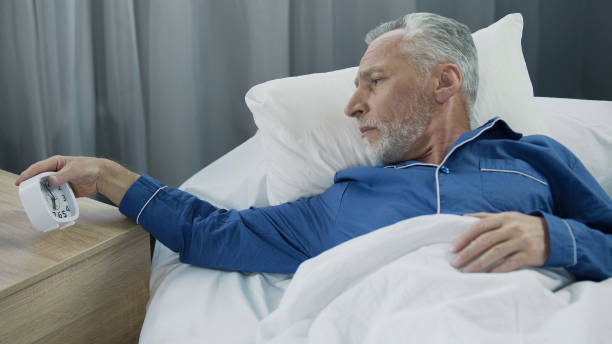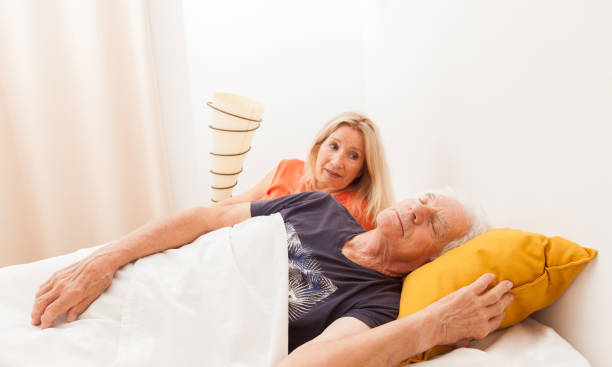Introduction

Sleep is vital to our overall well-being, allowing our bodies to recharge and rejuvenate. However, for individuals living with Parkinson's Disease, achieving a restful night's sleep can be a significant challenge. Parkinson's patients often experience sleep disturbances, which can be distressing and affect up to 90% of patients at some point during their journey with the Disease.
Fortunately, advancements in medical technology have paved the way for innovative devices designed to enhance sleep quality and address the unique needs of Parkinson's disease patients. These groundbreaking solutions are revolutionizing how we approach sleep management for individuals with this neurodegenerative disorder.
The Significance of sleep quality in Parkinson's disease patients
Sleep disturbances are a common problem for people with Parkinson's Disease (PD). Poor sleep quality can have a major impact on PD patients' physical, emotional, and cognitive health. Studies have shown poor sleep is associated with increased daytime fatigue, depression, and anxiety in PD patients.
In addition to these mental health concerns, poor sleep can lead to increased daytime sleepiness, which can threaten the safety of PD patients. For example, people with PD may be at greater risk for falls due to their impaired motor control and balance and their inability to react quickly in an emergency.
Innovative Devices for Improving Sleep Quality in Parkinson's Disease Patients
Research has consistently shown that disrupted sleep can harm Parkinson's disease patients, resulting in increased fatigue and impaired cognitive functioning. To address this issue, innovative devices are being developed to improve sleep quality for those with Parkinson's.
Here are 10 Innovative Tools to Improve Sleep Quality in Patients with Parkinson's Disease:
Sleep Monitoring Wearables:
Sleep monitoring wearables are becoming increasingly popular among people with Parkinson's Disease. These devices track activity during sleep, including body movement and breathing patterns. By tracking this data, they can provide insight into sleep quality and alert individuals of any potential abnormalities or disturbances in their sleep patterns.
Wearable devices can monitor changes in body temperature and heart rate, offering insight into how to adjust sleep-related habits and behaviors. With improved insight into the quality of their sleep, Parkinson's disease patients can then make informed decisions about their sleeping habits tailored to their needs. Additionally, these devices lead to better overall health and well-being.
Light Therapy Devices:
Light therapy devices are becoming increasingly popular among individuals with Parkinson's Disease to improve sleep quality. Exposure to bright light during early morning hours is called light therapy. It can reset the body's internal clock and trigger the release of hormones that increase alertness and wakefulness during the day. This therapy helps reduce fatigue and can make it easier for people with Parkinson's to be more active and alert in their daily routines.
Light therapy devices are specifically tailored to the individual's needs, allowing them to customize their light exposure according to their preferences. For example, some people prefer a bright, full-spectrum light that mimics natural sunlight, while others benefit from blue light emitted at a lower intensity. Additionally, some light therapy devices come with adjustable timers so that the individual can customize their exposure to the right amount of time for their specific needs.
Light therapy devices can also provide insight into how well an individual responds to the treatment. Some devices measure body temperature and hormone levels before and after each session, providing valuable feedback on how well the light therapy works and if adjustments need to be made. Additionally, with regular use of light therapy devices, individuals with Parkinson's can experience improved sleep quality, increased daytime alertness, and better overall mental health. Many people are using light therapy devices to improve their sleep quality because of their potential benefits.
Cognitive Behavioral Therapy for Insomnia (CBT-I):
CBT-I is a proven treatment that effectively treats insomnia.CBT-I helps individuals identify and address the underlying causes of their sleeplessness, such as poor sleep hygiene habits, negative thoughts about sleep, or difficulty managing stress. This approach incorporates various techniques and strategies, such as sleep restriction therapy, stimulus control therapy, cognitive restructuring, relaxation training, and goal setting.
Sleep restriction therapy involves gradually restricting the amount of time spent in bed to help maximize the quality of that time. This approach helps individuals avoid staying awake for too long in bed by limiting their sleeping hours to only when they can fall asleep.
Stimulus control therapy makes it easier for individuals to sleep more soundly at night by breaking any association between being in bed and activities that do not involve sleeping, such as watching television or working on a laptop. Cognitive restructuring is a technique that individuals can use to change their thoughts and attitudes about sleep. People can change their perception of sleep by focusing on the positive aspects of sleep instead of seeing it as a burdensome task or obligation.
Individuals can learn relaxation techniques like deep breathing and progressive muscle relaxation through relaxation training. Reducing stress and anxiety can enhance the quality of sleep. Lastly, goal setting enables individuals to track their progress and make changes to reach their desired sleep goals.
CBT-I is a proven and effective treatment for insomnia that can improve sleep quality and reduce insomnia symptoms. It helps individuals gain control over their sleeping habits, allowing them to get the restful night's sleep they need. Furthermore, this method cultivates essential abilities in individuals that aid them in better managing stress and anxiety. This is crucial for one's sustained health and well-being. With all these potential benefits in mind, it is easy to see why CBT-I has become such a popular treatment for insomnia.
White Noise Machines:

White noise machines are a popular tool for helping individuals achieve better sleep quality. White noise provides consistent, soothing background sound that can help mask disruptive environmental noises. This type of sound therapy helps reduce the time spent tossing and turning in bed due to distractions like car alarms, dogs barking, or loud neighbors. White noise machines have been found to improve sleep onset latency, meaning they can help you fall asleep faster. This type of sound therapy also helps individuals stay asleep for longer periods and experience improved overall sleep quality.
You have various options for white noise machines that can be tailored to your personal preferences and needs. Many machines are designed to be portable, making them easy to bring along with you when you travel or stay in a hotel. Other devices are made specifically for use while sleeping, often featuring an adjustable timer so the noise will shut off automatically after a certain time. Some white noise machines also have additional features like programmable soundscapes, allowing users to customize their sound experience.
White noise machines can be a great way to improve sleep quality in individuals with Parkinson's Disease. The consistent background sound helps mask disruptive noises and makes it easier for individuals to drift off into a peaceful night's sleep. Moreover, white noise machines are highly portable, making them an excellent aid for people who frequently travel or reside in unfamiliar places. With the proper use of these innovative devices, individuals with Parkinson's Disease can rest assured that they will get the best possible sleep quality no matter where they are.
Smart Pillows:

Smart pillows are becoming increasingly popular among those seeking improved sleep quality. These innovative devices feature special sensors that can track heart rate, breathing, and other vital signs while the individual is sleeping. Specialized software is used to analyze the data collected by the sensors and identify any possible problems or abnormalities that may affect the person's sleep.
Some smart pillows have other features like white noise generators, temperature control, and adjustable firmness settings. These extra features allow the user to customize their sleep experience, creating a more comfortable environment for restful nights of sleep. Additionally, many users find that having access to this data allows them to track their sleeping patterns and make informed decisions about improving their sleep quality.
Smart pillows can be a great tool for individuals with Parkinson's Disease seeking improved sleep quality. These devices are ideal for individuals who wish to understand the reasons for insufficient restful sleep. They have features and data analysis capabilities that can provide valuable information. People with Parkinson's can also benefit from the data as it can help them understand how the condition affects their sleep patterns and seek appropriate treatments.
Sleep Apps:
Sleep apps are a great tool for tracking and improving sleep quality in individuals with Parkinson's Disease. These applications can be used to track sleep patterns, record noise levels in the environment, detect snoring or other disturbances that may interfere with restful nights of sleep, and provide helpful tips on improving overall sleep quality.
Many sleep apps also have features like alarms and reminders, allowing users to set specific times for waking up or taking breaks throughout the day. For people with Parkinson's Disease who struggle to maintain a regular sleep routine, this could be very beneficial. Additionally, many apps offer advice on creating an optimal environment for sleep, such as avoiding certain activities in the evening or optimizing bedroom temperature and lighting.
Sleep apps are a convenient way for individuals with Parkinson's Disease to track their sleeping patterns and make any necessary changes to ensure better sleep quality. These applications can help individuals understand how their medical condition impacts their sleep and provide guidance on improving it. These innovative devices empower users to make informed decisions to enhance their sleep quality and get optimal rest every night.
Adaptive Bedding Systems:
Adaptive bedding systems are a great way for those with Parkinson's Disease to improve their sleep quality. The mattresses and pillows can be adjusted to fit the user's specific needs and preferences, providing a customized and comfortable sleeping experience.
Adaptive bedding systems use special sensors that track body movements and automatically adjust the mattress to provide support where needed. This allows users to find the perfect position for sleeping without worrying about disturbing their partner or trying to contort themselves into an uncomfortable position. Additionally, adaptive bedding systems can detect sleep disturbances and alert users with gentle vibrations that will help them return to a more
Adaptive bedding systems, including adjustable beds and specialized mattresses, can enhance sleep quality for patients with Parkinson's Disease. These systems allow for customized positioning, providing optimal support and comfort during sleep and minimizing the risk of pressure sores or discomfort.
FAQ's
How can I improve my sleep quality with Parkinson's?
To enhance your sleep quality while dealing with Parkinson's, maintain a consistent sleep schedule, keep your bedroom cool and dark, and avoid consuming caffeine or alcohol close to bedtime.
What is the best sleep aid for Parkinson's patients?
The best sleep aid for Parkinson's patients will depend on the individual and their needs. Some people may benefit from using a sleep app to track their sleeping patterns, while others may find an adaptive bedding system more helpful.
How do Parkinson's patients sleep at night?
Parkinson's Disease can cause difficulty sleeping at night. Individuals with Parkinson's need to create a consistent sleep schedule and keep their bedrooms dark, cool, and free of noise or distractions. Additionally, using an app to track one's sleep patterns and using adaptive bedding systems are effective ways of improving sleep quality.
What is the recent advanced treatment of Parkinson's Disease?
Recent advancements in treating Parkinson's Disease include deep brain stimulation, which uses electrical pulses to target areas of the brain affected by Parkinson's.
Conclusion
I hope this article has helped provide information about innovative devices and treatments that can improve sleep quality for individuals with Parkinson's Disease. With the help of adaptive bedding systems, sleep apps, and deep brain stimulation, those living with Parkinson's can get better rest and lead healthier lives. If you need clarification or want to discuss the options mentioned in the article, please get in touch with me.

